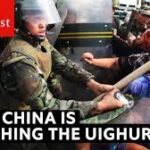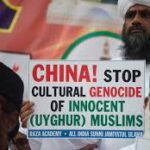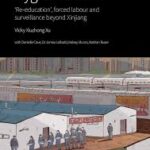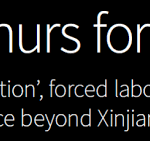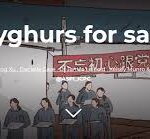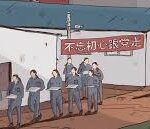Uighurs For Sale – a major report from the Australian Strategic Policy Institute – says that 82 well-known global brands in the technology, clothing and automotive sectors, including Apple, BMW, Gap, Huawei, Nike, Samsung, Sony and Volkswagen have over 80,000 forced Uighur labourers working in their supply chains
A major report from the Australian Strategic Policy Institute – entitled “Uygurs for Sale” deserves to be widely read.
https://www.aspi.org.au/report/uyghurs-sale
The Report estimates that Uyghurs are working in factories that are in the supply chains of at least 82 well-known global brands in the technology, clothing and automotive sectors, including Apple, BMW, Gap, Huawei, Nike, Samsung, Sony and Volkswagen.
It estimates that more than 80,000 Uyghurs were transferred out of Xinjiang to work in factories across China between 2017 and 2019, and some of them were sent directly from detention camps
Recommendations
The Chinese government should:
• give multinational companies unfettered access to allow them to investigate any abusive or forced labour practices in factories in China
• uphold the rights of all workers in China, especially those from vulnerable ethnic minorities, to determine how their labour is deployed and the conditions under which they leave their place of residence
• ratify the ILO International Labour Standards; structure a comprehensive grievance mechanism, including for the investigation of alleged cases of forced labour; provide victims with protection and remedies; and prosecute perpetrators
• uphold the legitimate rights of China’s citizens, including by protecting ethnic and religious rights enshrined in the Chinese Constitution.
Companies using forced Uyghur labour in their supply chains could find themselves in breach of laws which prohibit the importation of goods made with forced labour or mandate disclosure of forced labour supply chain risks.
Each company listed in this report should:
• conduct immediate and thorough human rights due diligence on its factory labour in China, including robust and independent social audits and inspections. The audits and inspections should include a stocktake of the conditions and current and ongoing safety of vulnerable workers
• if it finds that factories are implicated in forced labour, seek to use its leverage to address improper labour practices. In all cases where harm has occurred, it should take appropriate and immediate remedial action. Where it cannot, it should cease working with those factories
• ensure that it is fully transparent as it seeks to address all potential harms, including by reporting its due diligence and audit findings publicly.
Foreign governments should:
• identify opportunities to increase pressure on the Chinese government to end the use and facilitation of Uyghur forced labour and mass extrajudicial detention, including through the use of targeted sanctions on senior officials responsible for Xinjiang’s coercive labour transfers
• review trade agreements to restrict commodities and products being produced with forced labour
• identify opportunities to pressure the Chinese government into ratifying the Convention on Forced Labour, 1930 (No. 29),148 Abolition of Forced Labour Convention, 1957 (No.105)149 and the Protocol of 2014 to the Forced Labour Convention.
Consumers and civil society groups, including NGOs, labour unions and consumer advocacy groups, should:
• demand that companies that manufacture in China conduct due diligence and social audits to ensure that they’re not complicit in forced labour practices
• advocate for the recognition of continual, multilayered surveillance and monitoring of workers and their digital communications—both in and outside work hours—as an emerging and under-reported indicator of forced labour and an important human rights violation
• push brands to be more transparent about the make-up of their supply chains and the preventative measures they have put in place to ensure forced labour does not occur
• demand that companies make new public commitments, uphold current commitments, or both, to not use forced and coerced labour in their global supply chains and that they act quickly and publicly when such cases are identified.

